Genres: Queer Protagonists
Representation: Queer (Male) Protagonist, Normalised Bi/Pansexuality, mlm or M/M, background polyamory/group marriage, sexual assault survivor, trauma
ISBN: 1633884236
Goodreads

Rune Saint John, last child of the fallen Sun Court, is hired to search for Lady Judgment's missing son, Addam, on New Atlantis, the island city where the Atlanteans moved after ordinary humans destroyed their original home.
With his companion and bodyguard, Brand, he questions Addam's relatives and business contacts through the highest ranks of the nobles of New Atlantis. But as they investigate, they uncover more than a missing man: a legendary creature connected to the secret of the massacre of Rune's Court. In looking for Addam, can Rune find the truth behind his family's death and the torments of his past?
This is going to be a slightly non-conventional review.
Last year, I read and reviewed K.D. Edwards’ debut, The Last Sun. You can read that review over on Goodreads; it’s not one of my best, so I decided not to cross-post it here. But pretty much immediately, Last Sun skyrocketed to the top of my favourites shelf, and it’s stayed there. It shares that top spot with a few other books, but I doubt it’s going to be unseated any time soon, if ever.
I’ll talk about the book itself in a little bit. (If you like, you can skip my personal rambling and go straight to the review below; it’s clearly marked). But first I want to talk about what happened around this book. Specifically, what it did to my life.
I have fibromyalgia. In my case, that means I can’t easily handle physical books, or carry them around, so I read ebooks exclusively. (Eventually I’ll write about ereaders and how they intersect with disability and mental health. But that, to quote Michael Ende, is another story.) When I love a book beyond bearing, though, I track down a physical copy for my carefully-arranged shelves.
And sometimes – more often lately – I decide that what I must have is a signed copy. And that can get a little complicated, because even those rare authors who get book tours do not generally visit Finland, aka Where Sia Lives. Most of my favourite authors live somewhere in the USA; even if I manage to track down a bookshop where they’ve done a signing, the shop may not ship internationally. Or they’re out of signed copies by the time I contact them. Best case scenario, the shipping is going to be wince-inducing (tracked shipping is mandatory, because the Finnish postal service has a nasty habit of losing or blatantly stealing my overseas packages.)
With Last Sun, I eventually contacted K.D. Edwards directly. And he made it happen. I am ridiculously grateful for all the effort he went to, and it’s possible I cried real tears when it arrived, safe and sound with a beautiful inscription inside.
But the experience was about a lot more than a very cool author helping a very obsessed fan. Because it is so much easier to risk embarrassing yourself while communicating by email, and because I write stories of my own and know how it feels when a reader opens up to you, I stripped my heart bare to tell him what Last Sun meant to me. That was a private discussion I’m not going to detail here, but it was one of the first times – maybe the first time – that I actually spoke to an author on a person-to-person level. I was used to authors being distant, awe-inspiring figures; being on a first-name basis with one? Was more than a little mindblowing, and made Last Sun even more fiercely important to me.
And at the same time, Kathy and I, who’d already bonded over our shared adoration of Gregory Ashe’s Hollow Folk series, got to flail around like muppets (…okay, I was a muppet, Kathy manages to love things without being A Twit about it!) about this book too.
All these things together were huge influences in my eventually deciding to start a book blog at all. Even if Every Book a Doorway is still kind of cookie-cutter (and unbaked, at that!) it’s still become a big part of my life, that just keeps getting bigger and more fun.
ANYWAY. Fast-forward a bit; skip over months of likes and comments and doing heart-eyes at Last Sun fanart – commiserating over publishing delays and recommending LS to everyone who’d listen – skip (for now) over Kathy’s genius masterplan that you’ll hear more about another day – to this past Thursday. Wherein, in part for being a hardcore fan, and a cheerleader, and even more for working with Kathy on her masterplan, Keith sent me an e-ARC of Hanged Man.
Aka, Last Sun‘s sequel, and one of my most-anticipated books of the freaking year.
Reader, I locked my office door and shrieked like a hyperactive banshee, and I am not even a little bit ashamed.
At the last second, though, I decided to reread Last Sun before diving into Hanged Man. It’s been over a year, after all, and I wanted all the details fresh in my mind when I started book two!
I’M SO GLAD I DID. And thus, at last,
my review of Last Sun: take #2.
The Last Sun (The Tarot Sequence, #1) by K.D. EdwardsGenres: Queer Protagonists
Representation: Queer (Male) Protagonist, Normalised Bi/Pansexuality, mlm or M/M, background polyamory/group marriage, sexual assault survivor, trauma
ISBN: 1633884236
Goodreads

Rune Saint John, last child of the fallen Sun Court, is hired to search for Lady Judgment's missing son, Addam, on New Atlantis, the island city where the Atlanteans moved after ordinary humans destroyed their original home.
With his companion and bodyguard, Brand, he questions Addam's relatives and business contacts through the highest ranks of the nobles of New Atlantis. But as they investigate, they uncover more than a missing man: a legendary creature connected to the secret of the massacre of Rune's Court. In looking for Addam, can Rune find the truth behind his family's death and the torments of his past?
Atlantis is real.
Deal with it.
No, really. When Atlantis – home of the inspiration of most of humanity’s myths and legends – is revealed to the world, humanity reacted by trying to wipe it back off the map. Neither side came out unscathed, but ultimately, the Atlanteans awed the rest of the world into respectful wariness by creating New Atlantis, pulling abandoned buildings from across the globe with apparent ease to build themselves a new city where guns are illegal – and basically everything else goes.
Rune is the heir to the destroyed Sun Court, one of the 22 Houses collectively known as the Arcana, who inspired the human tarot cards – and rule New Atlantis. All he has left of the immense power, prestige and wealth of his heritage is a handful of sigils – magical items, mostly jewels, that can store spells – and his Companion, Brand, who is his brother, best friend, and bodyguard all rolled into one.
These things are not nothing, especially Brand, who I’ll be delighted to talk more about in a sec. But it does mean that Rune needs to tread carefully; he’s a prince without a court, a Scion without sigils, with few allies and unknown but powerful enemies – the destruction of the Sun Court wasn’t a legal, Arcana-sanctioned raid, and whoever was responsible is still out there. Mostly, though, Rune and Brand have made a relatively normal life for themselves – money is always tight, but they take jobs that are part mercenary-work, part PI stuff, and they manage.
Until Lord Tower – the man who took Rune in when the Sun Court fell, and who continues to be something of a patron to Rune – asks them to find his godson Addam, who is missing.
Now, that makes it sound like Last Sun is a fairly standard Urban Fantasy story. But surprise!
It absolutely isn’t.
In fact, it’s possible that Last Sun is best defined by what it is not, and what it doesn’t do, than what it actually is and does. The main character Rune, for example, is not your typical Urban Fantasy hero; he doesn’t brood, or mouth off, or think he’s invulnerable. He doesn’t have an endless supply of one-liners, superpowers, or enchanted items to fall back on. He doesn’t have the tobacco-chewing grit of down-and-dirty characters like Harry Dresden or Laytham Ballard; he doesn’t have what I call the grimdark mindset (and this is not, thank the gods, a grimdark book). He doesn’t throw his weight around; he doesn’t posture; he doesn’t price his pride above all else. He’s not crushed by the weight of his heritage, and he’s not arrogant about it either.
Rune is what you get when a writer sits down and decides that all the toxic masculinity/alpha-male bs is going out the window. All the Urban Fantasy tropes, all the M/M stereotypes, every expectation a reader might bring to this book…out they go.
Rune slaps the snooze button on his alarm until Brand drags him out of bed. He’s methodical and careful. He’s slightly insecure about having put on weight. He’s isolated and rejected by his people, but still places an enormously high value on human (and not-so-human, for that matter) life. He hides his snack food in the air vents where Brand will absolutely not find it. He struggles to make ends meet, but it hasn’t made him bitter – although he’s still human enough to feel jealous and envious of the casual wealth of other Scions. What’s especially noteworthy is how he acknowledges his own envy, processes it, and moves on, and honestly that’s a major part of what makes this book so special: Rune isn’t afraid to have or express emotions, even when those emotions are not ‘good’ ones – like jealousy – or ones our society tells us men aren’t supposed to have – like being sexually shy or insecure about what he has to offer a romantic partner.
It does not speak well of our storytelling culture that this is so refreshing, but it does speak very well of Last Sun. And this subverting of expectations continues throughout the book. Everything that you’ve ever rolled your eyes at in an urban fantasy or Hollywood action film – those things don’t happen here. Because Edwards has damn well thought about everything, and all the things that are wonderfully cinematic but oh-so-stupid from a plot perspective? They don’t happen here. Rune doesn’t make those choices and doesn’t behave in those ways. Which means that the twists and turns are actually twisty as hell, because every time you think you know what’s coming next – you’re wrong.
Until you hit the halfway mark and realise, you no longer have any idea about what’s going to happen in the rest of the book. None. When I hit the 50% mark on my Kindle, I was stunned: so much had happened! None of it felt rushed, the pacing was absolutely flawless, but still: half of this book is more potent by far than any other ten urban fantasies I could name, so the second half?
It blew me away.
The plot itself is for you to discover – I’m definitely not spoiling any of the surprises for you – but I think we need to talk about the Companion bond. This is the magical, empathic connection forged between Rune and Brand when they were both infants; Brand, who is human, not Atlantean, was then intensely trained to serve as…well, as a Companion, which in Atlantean culture is kind of like a super-bodyguard (although the specific dynamic between Companions is unique to each bond; the other Companion pair we see in Last Sun don’t have nearly the same kind of relationship that Rune and Brand do.) And I think it says something important and sneaky and clever that the most important relationship in this book – in this series – is Rune and Brand’s. It’s not romantic or sexual (although I’m more than happy to ship it), but it is unquestionably love, much deeper and more devoted than anything men are typically allowed to have or express for each other. They would die for each other without hesitation – despite Brand appearing, from the outside, to be a very typical action hero, constantly swearing, weighed down with hidden weapons, and a more-than-expert marksman. It’s not a mask, exactly – Brand is always cursing, does always have two dozen weapons hidden about his person, and could shoot the wing off a gnat from a block away. It’s just that none of those things mean he can’t also love Rune with everything he has.
The only fictional relationship I can think of that bears any resemblance to this is Steve and Bucky in the Marvel universe, and to be honest, even that friendship pales in comparison to Rune and Brand’s. This is the kind of love – so strong, so potent, so depthless – that our society can’t really understand without declaring it romantic, and don’t get me wrong; I won’t be at all unhappy if somewhere down the road, that’s where this goes. But it’s important that right now, it isn’t romantic. It’s important to showcase this kind of platonic love. It’s important to say ‘no, sometimes romance is not the most important kind of love’. It’s also important to drive home the point of ‘there is nothing wrong or weird about this. It is rare, but it should be embraced when it is found’.
This is a world where queerness is completely normalised; Atlantean society views bi/pansexuality as the default. Rune has a male love interest in this book. And somehow those things only make me even happier that the central relationship is not romantic. Maybe because queerness is so often heavily sexualised; two men kissing is somehow inherently obscene, eliciting cries of ‘think of the children!’ despite every flagship Disney film ending in a male/female marriage – so in this deeply queer novel, set in a society where group-marriage is commonplace and sexuality is extremely free, it’s yet another expectation subverted to see the value placed on a platonic relationship instead of a romantic one.
Am I making any kind of sense at all?
And I can’t help thinking that a lot of this cannot possibly be accidental. I am convinced that Edwards spent a lot of time building his world, his characters, and his magic system. The best evidence I have of this is one of my favourite of Rune’s qualities: his ability to think outside the box, and do it fast. Atlantean magic, you see, relies heavily on the sigils I mentioned earlier: objects a magic-user can ‘charge’ with a spell, with that spell to be released when the sigil’s owner chooses. Very, very few Atlanteans can cast anything but cantrips – tiny, mini-magics – on the fly; they are reliant on their sigils. And Rune only has a handful left to him – unlike your average Scion, who casually carry dozens and can pull hundreds more from their House vaults at need.
This means that whenever Rune goes anywhere – especially anywhere he might be in danger – he has to decide very, very carefully which spells to charge his sigils with – it’s not an option for him to go out with a hundred sigils all filled with just-in-case spells. And that means that he’s learned to be extremely versatile with a small number of spells, using them in ways other Scions would never think to, to great effect. It’s extremely tricksy, delightful, and conveys so much about him without Edwards needing to spell it out for the reader; you can’t help thinking about how hard Rune must have trained, for example, and for how long, to find all these ways of using these spells, even though Edwards does not show us that training – but then, he doesn’t need to. Just like he doesn’t need to state that teaching himself to think outside the box has aided Rune in other parts of his life than his magic-use. There’s no need to tell us that Rune was probably motivated, in part, by the drive to prove himself the equal of any other, more sigil-wealthy Scion – or that he was definitely motivated by the need to be sure he could protect Brand (and, to a lesser extent, probably himself as well) in the new, cold world they found themselves in after the fall of the Sun Court.
See? Tiny details – like Rune utilising a Shield spell in a clever, I-wouldn’t-have-thought-of-that way – implies a wealth of backstory and character development. Edwards must have done a ton of thinking just to come up with the ways that Rune uses his limited magic – but it’s the way he manages to fit a much, much longer book inside this one that convinces me he’s a master of his own craft.
And it’s just so freaking cool to me that Rune’s superpower isn’t a superpower, as such; it’s the fact that he knows his limits to the absolute millimetre, and utilises everything inside of them in ruthlessly creative ways. I find that a hell of a lot more impressive than, say, Lord Tower flinging incredible pieces of magic out of one of his hundreds of sigils. Age and experience will have Rune learn all the rare, cinematic spells eventually, and hopefully he’ll someday have more sigils of his own. But raw power and esoteric knowledge just aren’t as impressive as precision, creativity and innovation – not in my book.
(…Although I might not say so where Lord Tower can hear me!)
Another of the reasons I adore Rune – and I do adore him, have I said that explicitly yet? – is his set of principles. Rune is literally too poor to have the same kind of nose-in-the-air arrogance as other Scions; there are things some people wouldn’t consider honourable that Rune wouldn’t hesitate to do, because it’s practical and expedient and necessary. A bit like comparing a mercenary, with real-life experience in fighting mean and dirty, to a champion fencer; one will survive in the real world, and one won’t. That said, Rune has very strict lines, and the fact that he cares for the lives of others – even complete strangers to him – says…a lot. On several occasions we see him put himself in danger to rescue or protect those who can’t defend themselves – and we see that behaviour contrasted with that of other Scions, most of whom wouldn’t risk a papercut to save someone else, and would be offended to be asked to. On the one hand, that does make me wonder what Rune would have been like if he’d been raised within a healthy, living Sun Court – we hear his father referred to as a good ruler, but what does that mean, really? Would Rune have ended up a spoiled prince if not for the tragedy of his court’s death? I don’t think so; the snippets and references we get to his childhood make me think he was always going to become this person, but of course, there’s no way to really know.
One thing that might partially explain his fiercely protective streak is that he’s a sexual assault survivor, something that is handled carefully and respectfully by the narrative, if not by Atlantean society, which has no tolerance or compassion for victims. (Although that originally felt unrealisic to me, after pausing to consider how our society treats survivors of all kinds, I think it might just be that the Atlanteans are more honest about their feelings regarding survivors than humanity is). To them, he’s worse than a prince without a crown; he’s a victim, fetishised and ostracised by those who should be his people. Between that, and growing up very aware of his powerlessness with his court being gone, I think he’d have ended up identifying with the defenceless even if he had been a spoiled brat before.
It is, however, a really interesting stand for a Scion to take, given the semi-feudal Atlantean society. Rune – and Brand, although for him Rune’s wellbeing trumps anyone else’s, always – firmly and fiercely believes that the Arcana are supposed to protect those who can’t protect themselves. Other Scions, as I already said, don’t generally share that view. So it’s another thing that puts Rune at odds with his own people; the fact that most Scions fritter away their sigils on useless cosmetic-or-fashion spells instead of anything useful is a major source of contention not just born from Rune’s envy that other Scions have the sigils to waste. One of my favourite scenes involves Rune pointing out that Brand – who is completely human and has no magic, beyond the Companion bond itself – was infinitely more useful in a firefight than a rich and ostensibly powerful Scion.
I’m going to wrap this up with a (hopefully brief, but I make no promises) look at some of the symbolism in this book. The Tarot Sequence is literally named after the tarot, after all, and tarot is all about symbolism. I don’t know how well Edwards knows tarot, but given the care that went into every other aspect of the book, I’d be stunned if he didn’t do his homework. And as a tarot reader myself – I own far too many decks and am not even the tiniest bit sorry – it’s an angle that really interests me.
(I’d first like to point out that Rune’s official House/family name is Saint John. All the Arcana Houses are Saint _____; the House of Justice are Saint Nicholas, for example. But Saint John pointed me towards Saint John’s Wort, an herb with a long history in magical folklore. The whole time I was rereading Last Sun, it was bugging me; I could have sworn there was some link between the sun and the herb. And when I went to look it up, Witchipedia confirmed it for me; Saint John’s Wort is indeed tied to the sun, a connection apparently formed because the plant flowers in time for Midsummer, and the blossoms were thought to resemble suns. Its sap is red, and has been used as a symbolic stand-in for human blood in all kinds of rituals. Given the state of the Sun Court’s estate – packed full of ghosts – it’s painfully appropriate that Saint John’s Wort is/was used for exorcisms, particularly of poltergeists (spirits that specifically hang out in human homes!) and in charms that protected the wearer from wounds caused by swords, knives, and bullets (I bet Brand would be DELIGHTED if they could make that one work!) One of the plant’s names literally translates as sword-herb in ancient Greek.
Coincidence? I don’t bloody think so! Just how much homework did you do for this book, Edwards?!)
AHEM. Now – briefly, if I can manage it – a little musing on the tarot symbolism in Last Sun.
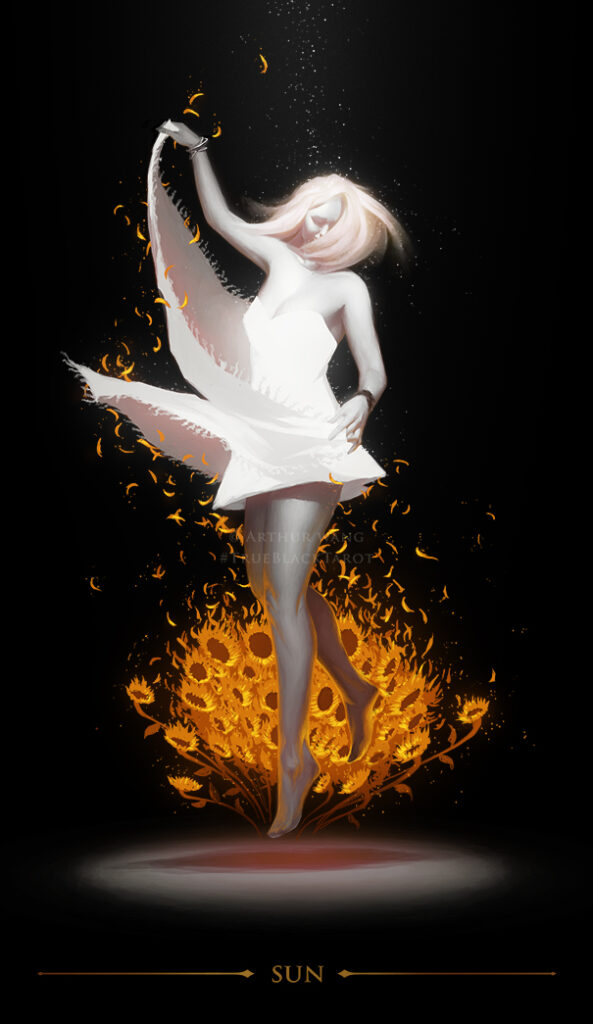
Although the nuance varies slightly from deck to deck, in the Rider-Waite Smith school of tarot (the most popular and widespread), the Sun is a card of light and joy; the light at the end of the tunnel, if you’ve been having it rough, and the inner strength burning inside all of us. In a reading, it’s often a message to connect to that inner fire, or a reminder that you hold it within you, and in that I think it’s a perfect card to go with this particular book, because in a very real way, the events of Last Sun are Rune’s wake-up call; he’s had a fairly calm and normal (for some definitions of normal, anyway) life for a little while, for the last few years – but now it’s time to get his destiny back on track. It’s time to remember – and reclaim – who he is; his bloodline, his heritage, his power. To quote Biddy Tarot, the clearest go-to site when it comes to card meanings;
Whether he wants it or not, it’s time for his story to start. And I very, very much recommend that you join him in it. It’s one you really shouldn’t miss.
The cards say so.
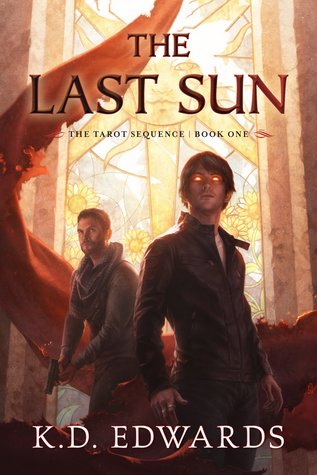

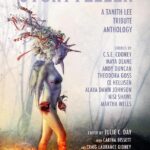

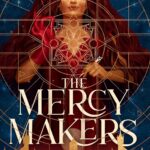
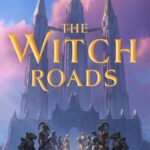
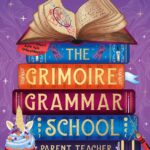
This is an amazing review, and I agree with every word! Enjoy The Hanged Man, it’s a treat😁
Thank you so much!
And I actually finished Hanged Man before I finished writing this review! IT’S SO GOOD. IT’S SO SO SO GOOD. I THINK IT BROKE ME.